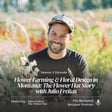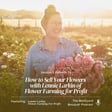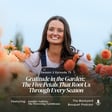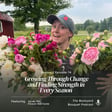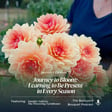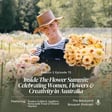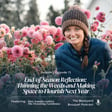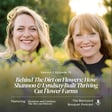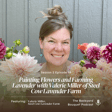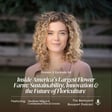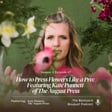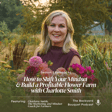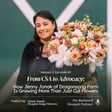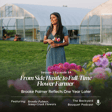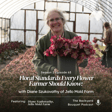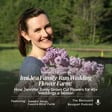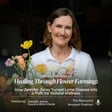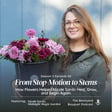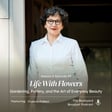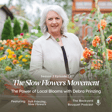
Ep.43: Cultivating Kindness & Connection With The Growing Kindness Project
What if the simple act of giving flowers could transform not only your life but also the lives of those around you? In this episode of the Backyard Bouquet Podcast, host Jennifer Gulizia welcomes Deanna Kitchen, the founder of the Growing Kindness Project and the heart behind Twig and Vine Farm. Deanna shares her inspiring journey from a kindergarten teacher to a flower farmer, revealing how flowers became a source of healing during a challenging time in her life.
Deanna explains that her initial foray into gardening was a personal endeavor, helping her navigate feelings of isolation and postpartum depression. As she began to share her homegrown flowers with her community, she discovered the profound impact of kindness and connection. This realization led her to establish the Growing Kindness Project, a nonprofit organization dedicated to spreading joy and fostering community through the act of giving flowers.
Throughout the conversation, Deanna discusses the importance of community and the ripple effect of kindness. She emphasizes that flowers serve as a powerful catalyst for connection, allowing individuals to engage with one another in meaningful ways. Deanna also shares her vision for the future of the Growing Kindness Project, which includes the hope of establishing a Growing Kindness garden in every community around the world.
Tune in to today's episode to be captivated by Deanna's heartfelt stories and her passion for creating a movement centered around kindness and flowers. Be sure to listen to the full conversation and discover how you can get involved in spreading a little kindness in your own community!
In This Episode You’ll Hear About:
00:00-04:20: Cultivating Kindness Through Flowers
04:20-07:29: From Gardening to Community Impact
08:31-12:23: Growing Kindness: Creating a Nonprofit
12:24-15:04: Ripple Effects of Kindness: Creating Connections Through Flowers
28:26-31:42: Finding Purpose and Healing Through Giving
37:08-41:37: Community and Connection through Gardening
42:15-44:14: Envisioning the Future of Growing Kindness
45:13-48:46: Embracing the Power of Asking and Giving
50:45-55:33: Balancing Generosity and Profit in the Floral Industry
55:33-58:13: Community Generosity and the Value of Flowers
58:27-01:02:05: Flowers as Tools for Kindness and Community Connection
01:03:17-01:04:27: The Impact of Giving
Show Notes: https://thefloweringfarmhouse.com/2024/12/12/ep-43-growing-kindness-project/
Learn More About The Growing Kindness Project
- Web: https://www.growingkindnessproject.org/
- Instagram: https://www.instagram.com/growingkindnessproject/
- Facebook: https://www.facebook.com/profile.php?id=100066888799511
Podcast Listeners Enjoy 7 Days of Growth Day FREE: https://www.growthday.com/?via=floweringfarmhouse
Sign up for our newsletter: https://bit.ly/thefloweringfarmhousenewsletter
***Rate, Review, & Follow The Backyard Bouquet***
If you enjoyed this episode, will you please consider leaving the podcast a review? Your review helps make the podcast more discoverable to others and allows me to continue creating more episodes. I'd love to know what you enjoyed most about the episode.
New episodes every week to help keep your garden blooming!
